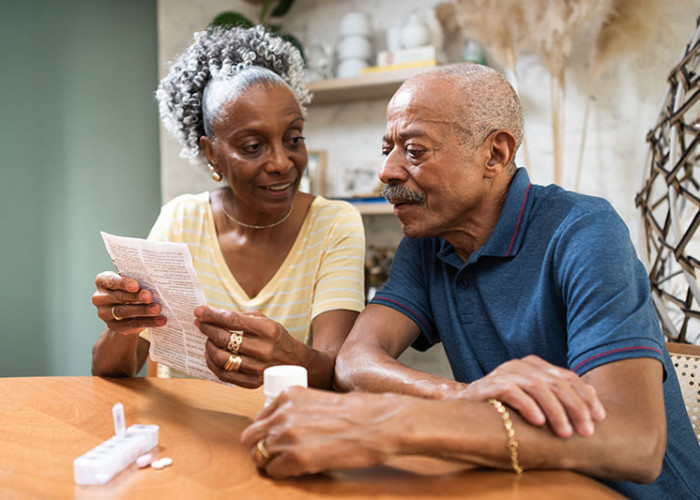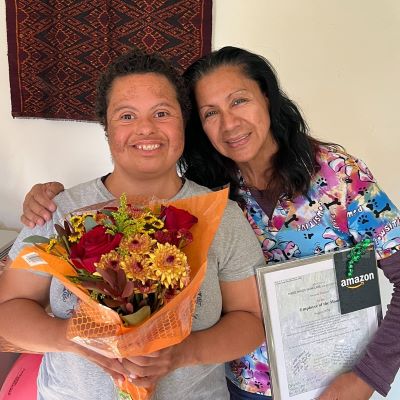Search Results for "medications"
Take These Steps to Avoid Overmedication and Adverse Medication Reactions in Seniors
Taking too much or too little of a medication or taking it the wrong way can lead to adverse medication reactions in seniors.
The days of “take two aspirin and call me in the morning” have morphed into “take two of these…and two of these…and maybe one of those, too!” Nearly forty percent of seniors are taking at least five different prescription medications each day – not to mention vitamins, supplements, and OTC meds. It is easy to understand why overmedication and adverse medication reactions in seniors are extremely common.
Take these actions to avoid medication problems for someone you love:
Make a list, and check it twice. Create a list of every one of the medications – both over-the-counter and prescription – that the person is currently taking. Share the list with all of their healthcare providers, and … Read More »
How to Overcome Sleeping Problems in Dementia
Try these tips to help someone experiencing sleeping problems in dementia get a better night’s rest.
If it seems like a senior with dementia has completely rewritten the rules on when and how to sleep, you’re not dreaming. For reasons that aren’t yet fully understood, sleeping problems in dementia are quite common. Changes to the senior’s circadian rhythm lead to drowsy days and sleepless nights.
The development of the disease is one contributing factor. Damage to brain cells causes increased weakness, making everyday tasks and activities exhausting. Medication side effects from commonly-prescribed dementia treatments can further exacerbate the issue.
Why Is a Good Night’s Sleep Crucial for a Loved One with Alzheimer’s?
Decreased sleep quality in dementia may bring about an increase in restlessness and delusions, and can cause serious safety concerns, such as the potential for an … Read More »
How to Tell the Difference Between Dementia and Medication Side Effects
With so many similarities, can you tell the difference between dementia and medication side effects?
Disorientation. Confusion. Memory loss. While these are certainly hallmark symptoms of Alzheimer’s disease and other types of dementia, they may also come about from taking certain medications. Before automatically assuming an inevitable diagnosis of dementia, review the following list of prescribed medicines that can cause similar adverse effects in order to help tell the difference between dementia and medication side effects.
Concerned It Might Be Dementia? Here’s How to Bring It Up to the Doctor.
You may be afraid to talk with the doctor if you’re concerned it might be dementia, but these tips can help.
Distress. Embarrassment. Fear. If you’re concerned it might be dementia, the feelings surrounding a potential diagnosis can force you to keep your suspicions to yourself. An AARP survey peeled away some of the layers of emotion to find the reason – namely, worry over losing independence and becoming a burden to others.
While there is some truth to these worries, there are also some misconceptions fueling them. As an example, roughly 1/2 of the participants, who were adults age 40 and over, believe they’re likely to get dementia as they grow older. The truth is that just over 10% of older adults over age 65 are identified as having Alzheimer’s disease.
Because of this, it’s critical for … Read More »
Unique Dementia Signs to Watch For in Latinos
Learn the distinct dementia signs to watch for in Latinos.
A new study sponsored by the Alzheimer’s Association is uncovering some striking results in how dementia may show differently in Hispanic people. While further research is necessary to fully understand whether these differences are the consequence of social/cultural nuances or the dementia itself, it is beneficial information for Latino families to learn the specific dementia signs to watch for in Latinos.
What Are the Unique Dementia Signs for Hispanic Seniors?
Daily Life Activities
One feature of this research was the dramatically faster decline in the capability to do everyday activities, including walking, getting dressed, and taking a shower, when compared with other ethnicities. Andrea Ochoa Lopez, the University of Houston doctoral student who performed the research, explained that the cultural dedication to caring for older relations can be … Read More »
The Post-Pandemic Health Care Appointments You Should Schedule Today
Learn about three post-pandemic health care appointments you may have been putting off, and why you should get them scheduled.
At the start of the pandemic, life as we knew it came to a screeching halt – including, in many cases, our health care needs. Dr. Ned Sharpless, director of the National Cancer Institute, shares, “There was a time, early in the pandemic, when we didn’t know much about this virus. So at that time, I think hospitals and clinics closing – that made sense.” But he goes on to explain that we know more now – and now is the time to get back on track with post-pandemic health care appointments and procedures.
We have evidence now that the health risks of avoiding exams and tests outweighs the risk of contracting COVID-19. Experts have outlined three key … Read More »
Learn How to Ease Caregiver Stress by Trading Worries for Positive Action
“Worrying is using your imagination to create something you don’t want.” – Abraham Hicks
Discover how to ease caregiver stress in three simple steps.
Worrying can quickly become a way of life for family caregivers. Between age-related concerns, chronic health conditions, and trying to balance a plethora of other commitments, it’s no wonder that anxious thoughts tend to overtake positive, peace-inducing ones, making it difficult to know just how to ease caregiver stress.
How Can You Alleviate Caregiver Worries?
It is possible, however, to take the energy you’re exerting for worry and changing it into productivity. These three simple steps are a great place to start:
To start, write it all down. Worrisome, anxious thoughts have a tendency to swirl haphazardly through our minds. If you write down your thoughts, it corrals them into manageable chunks, while giving … Read More »
How to Tell if It’s Delirium or Dementia
Learn whether a senior may be experiencing delirium or dementia, and how you can help.
Although dementia takes center stage in diagnoses for older individuals who are struggling with confusion, memory lapses, and disorientation, there’s another condition that is also common, producing similar symptoms, and most importantly, can be cured: delirium. In fact, as many as ¾ of older adults experience delirium after a surgical procedure or infection, and proper diagnosis is crucial to ensure proper treatment. So how can you tell if it’s delirium or dementia impacting someone you love?
One of the biggest differentiators in delirium is that it arises quite suddenly. It also has a tendency to cause symptoms that come and go throughout the day, as opposed to dementia’s slow, steady, ongoing, and rather predictable progression. For example, a person with delirium may struggle … Read More »
How to Empower Seniors to Take Control for Better Chronic Health Care
Seniors know best what they’re dealing with; empower them to take control of their chronic health care needs.
When it comes to chronic health care, seniors are the experts, hands down, with up to three out of four seniors affected by a number of conditions that are ongoing, necessitate long-term medical treatment, and place restrictions on activities. With the never-ending barrage of bloodwork as well as other tests, physicians’ appointments and procedures, and medications, managing chronic diseases usually takes both a physical and emotional toll, and may quickly become daunting.
Dr. Mary Tinetti, chief of geriatrics and internist at Yale School of Medicine, said, “Once you get three, four, or five and six diseases, several things happen: Number one, almost guaranteed, trying to get one of these diseases under control is going to make one of the other … Read More »
How to Help Someone with Parkinson’s from a Distance
If you’re wondering how to help someone with Parkinson’s disease when you live out of the area, we have four suggestions for you.
The days when extended families lived together on neighboring plots of land are, unfortunately, a thing of the past in many cases. With loved ones spread apart, it’s not always possible to provide the caring, hands-on care and support that older family members often need, especially when a chronic health condition – like Parkinson’s disease – creates additional concerns.
Yet even from a distance, there are still plenty of ways to assist. The Michael J. Fox Foundation offers these tips on how to help someone with Parkinson’s from afar:
Get organized. Take and keep detailed notes about medications being taken, treatments, emergency contacts, and other aspects of the person’s care needs. A digital version of this … Read More »
















